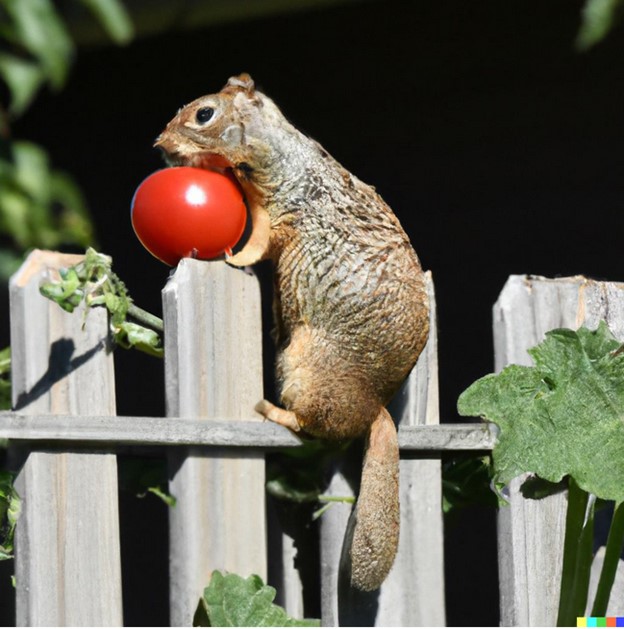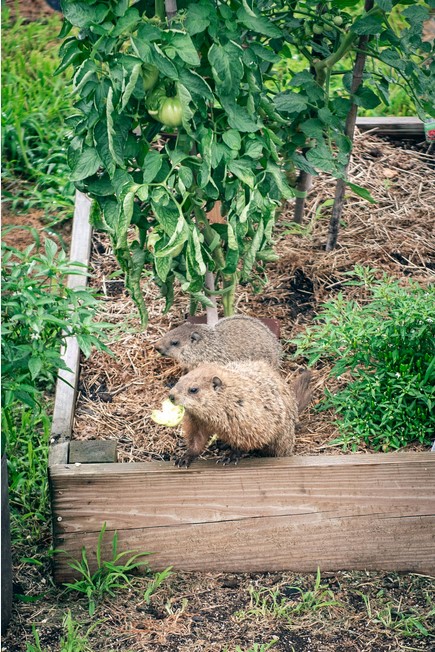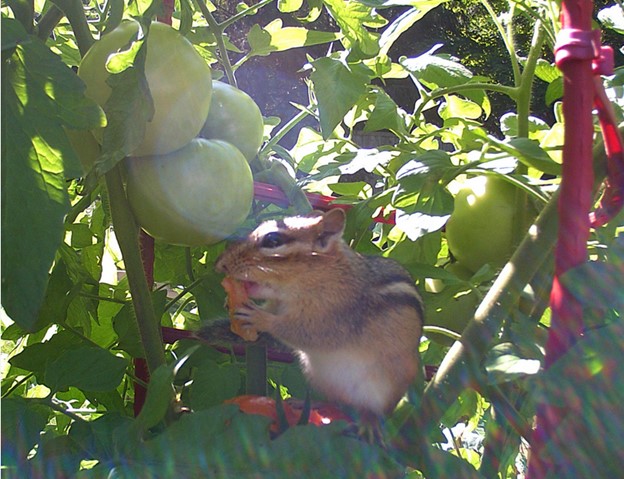Protecting and safeguarding your tomato plants from squirrels is challenging, as these little creatures are often drawn to your garden’s bounty.
Several effective strategies exist to deter squirrels, each with its own unique set of advantages. Each method creates an environment that discourages squirrels from making your garden a feeding spot.
So, let us discuss some techniques that will offer practical solutions to keep them away from your tomato plants and in turn protect your plants from squirrel damage.
But before you go ahead, learn How To Take Care Of A Tomato Plant?
Natural Deterrents To Keep The Squirrels Away From Your Tomatoes
Table of Contents

Keeping squirrels away from tomato plants is indeed challenging, but several natural methods are effective and can be tried. We have discussed some of the well-known methods to protect tomato plants from squirrel damage.
Now, take a look at some of the ways to prevent squirrels from eating your tomatoes:
Physical Barriers
Protect your tomatoes using specific physical barriers such as bird netting, deer netting, wired cages, or row covers. These are made of lightweight plastic and are specifically designed to keep the birds and a few other animals away without blocking the air or sunlight.
Putting the nets over the tomato plants and securing the edges with stakes, rocks, or garden staples will prevent the squirrels from crawling under and save your growing tomatoes.
Using wired cages made of chicken wire, hardware cloth, or welded wire will also prevent the squirrels from squeezing in. To do this, bury the bottom edge of the cage a few inches into the soil to prevent the squirrels from digging underneath.
Row covers made of spun-bonded polyester or polypropylene will provide a barrier against the squirrel and protect against frost in cooler seasons.
So, go ahead and use these physical barriers that can provide robust protection for your tomato plants and ensure that squirrels are kept at bay without harm.
Homemade Repellent Sprays
Applying homemade repellent sprays, such as Pepper and Garlic Spray, around tomato plants will do wonders. They will keep squirrels at bay and prevent them from surrounding your tomato plants.
Squirrels dislike the strong scent and taste of these items so use them in making homemade repellent sprays and you’ll soon be successful in repelling the squirrels. Spray them around the tomato plants in sufficient quantities to repel squirrels. But do not forget to reapply after rain or heavy watering as the solution can be washed away easily. This is an excellent solution to scare away squirrels from your garden plants and discourage them from giving small bites on your tomatoes.
Therefore, these homemade sprays are an excellent way to deter squirrels and other pests naturally by keeping your tomato plants safe without using harmful chemicals.
Eliminate Hiding Spots
Squirrels prefer environments where they feel safe and secure. By removing their hiding spots, you will make your garden less attractive to them and can reduce their presence.
Home gardeners can regularly walk through your garden, spot the new hiding spots, and disrupt them for the squirrel activity. Also, finding any potential nesting areas will discourage them from settling in and hence will be an effective squirrel-deterring way.
Eliminating the hiding spots will reduce the likelihood of them targeting the tomato plants in your garden and can prove to be an excellent way to deter squirrels naturally.
Provide An Alternate Food Source

Providing an alternative food source will help deter squirrels from your tomato plants by diverting their attention to another food source. Also, offering squirrels a more appealing and accessible food option away from your garden will keep them away from your tomatoes.
To maintain their effectiveness, make sure you arrange and place the alternative food source at a considerable distance from your tomato plants to draw the squirrels away.
Remember to refill the food constantly so that it becomes more appealing and, in turn, more effective in deterring squirrels from your garden.
Natural Scent Deterrents
Natural scent deterrents such as coffee grounds, citrus peels, and vinegar deter squirrels, as they dislike these particular scents. For best results, spray or scatter these around your homegrown tomato plants to keep your garden squirrel-free.
Sprinkle the coffee grounds, scatter the citrus peels, soak cotton balls with vinegar, and place them in your garden to maintain a strong smell and prevent squirrels from nibbling on tomatoes.
Plants And Herbs
Plants such as mints, marigolds, onions, and garlic are used to deter squirrels. They have a potent smell that squirrels find offensive, making them an effective natural repellent.
The strong scent emitted by these plants is unpleasant to squirrels and thus prevents squirrels from taking over your garden. Use these plants to create an effective barrier and strategically place them around the tomato plants to maximize their effectiveness.
Not only this, but these particular plants also add a touch of beauty and diversity to your garden. Keeping these plants will enhance the garden ambiance and be an effective strategy to keep squirrels away.
Commercial Squirrel Repellents For Tomato Plants

Motion And Noise Deterrents
Motion-activated sprinklers have sensors that detect movement, such as squirrels or other animals, and release a burst of water that startles and scares the squirrels away.
These sprinklers cover a specific area, making them ideal for protecting the targeted spots. They should be positioned in the appropriate areas or near your tomato plants. You only need to adjust the sensitivity and range of the sensor according to the size of the area that you want to protect. When squirrels come to nibble the tomatoes, these detectors get activated, scaring the squirrels.
Placing reflective objects such as CDs, aluminum foil strips, or mirrors acts as visual distractions, so the squirrels get startled and become cautious before approaching the targeted area. Hanging these reflective objects at varying heights will create reflections and movements and act as a natural deterrent.
Wind Chimes also act as an auditory distraction, producing sound when moved by wind and creating a continuous noise that deters squirrels.
Spray Repellents
Commercially used repellents contain natural or mostly synthetic compounds that emit odors or taste unpleasant to squirrels. The common ingredients are hot pepper or garlic spray, which are mostly available in the market.
Due to their solid and unpleasant smell, cayenne or chili pepper spray near your garden can keep squirrels away. Spraying them directly on tomato plants and the surrounding areas will act as an effective deterrent that the squirrels find unpleasant while trying to feed on the fruits of the tomato plants.
Predator Scents
Squirrels fear predators such as foxes, coyotes, and other carnivores, so using their urine and spraying it near the tomato plants will keep them away.
After smelling the scent of a predator, even if it is in the form of urine, they perceive it as a threat and avoid the area to reduce their risk of predation.
These predator urines are available in liquid form or as granules and are generally stored at garden centers or other outdoor supply stores. Read the instructions carefully and apply them around the edges of your tomato plants to create a barrier that will help deter the squirrels.
Decoys
Spreading decoys of owls or hawks acts as a visual deterrent as the squirrels perceive those as threats and avoid these areas because they believe predators are present in the nearby areas. Soon, they start avoiding those areas and as a result, your tomato plants get protected.
Positioning the decoys strategically will act as a perceived threat and an effective deterrent. So, make sure you use it in your garden area and place it strategically to keep the squirrels away.
Ultrasonic Devices
The Ultrasonic sound waves emitted from the devices are irritating to squirrels, so they should be installed near tomato plants or garden areas to prevent squirrels from entering your garden.
Relying on these ultrasonic devices is an excellent way to deter squirrels, but their effectiveness is sometimes influenced by environmental factors and the squirrel’s behavior.
The high-frequency sound waves are irritating to these animals and, hence, are very effective in keeping the squirrels away. They are specifically designed to be uncomfortable or distressing to pets and drive them away from the area.
You need to place these ultrasonic devices around the perimeter of your garden or near the tomato plants at the right height and angle for optimal coverage. The discomfort caused by the sound encourages them to move to a different place as they prefer quieter and more comfortable environments.
Will the Companion Plants Help Keep The Squirrels Away From Tomatoes?

The companion plants create a less favorable environment for squirrels and, therefore, help keep them away from tomatoes.
These companion plants, such as marigolds, onions, garlic, and mint, have repellent properties, so planting these around the tomato plants can create a barrier of scent that deters squirrels from approaching.
The strong barrier of scent will deter the squirrels from approaching, and if placed strategically, it will help indirectly keep the squirrel populations in check.
Also, companion plants with dense foliage or tall growth habits will create physical barriers that make it difficult for squirrels to access the tomato plants.
Wrapping Up
So, experiment with the various methods to protect your precious tomatoes and transform your garden into a squirrel-free zone.
Remember, keeping squirrels away from the tomato plants needs a strategic blend of deterrents and proactive measures to help create a less inviting environment for these little creatures.
With a generous amount of patience and ingenuity, you can now enjoy a bountiful tomato harvest.
Leave a Reply